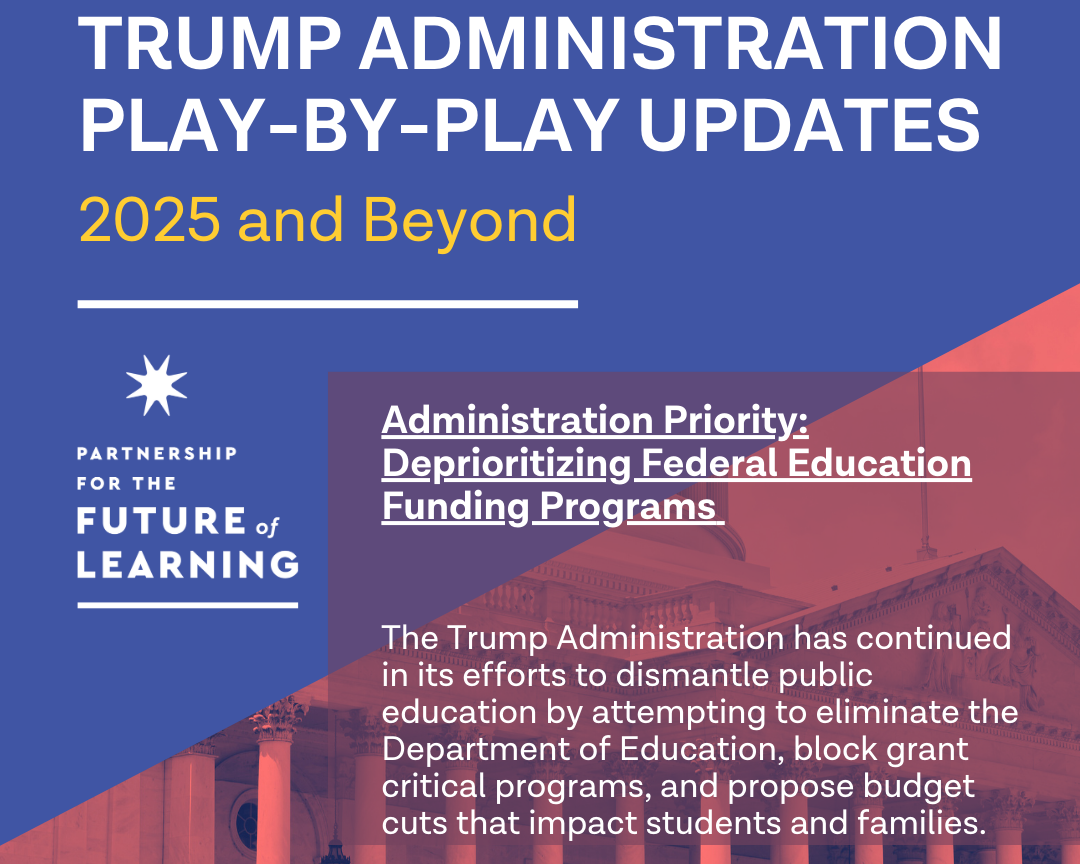September 2025
Passage of Federal Voucher Legislation
On July 4th, President Trump signed the "One Big Beautiful Bill Act" (H.R. 1) thereby enacting the first permanent federal tax credit voucher program into law. This legislation will cause unprecedented harm for students and families, and especially for low-income communities and communities of color.
How it Works:
The federal tax credit voucher program allows an individual who donates money to a Scholarship Granting Organization (SGO) for a private school voucher to receive a dollar-for-dollar tax credit to offset their federal taxes. Voucher recipients are eligible if their household income falls under 300 percent of the area median gross income. The credit cannot exceed $1,700 per taxpayer however, this is likely doubled for married couples at $3,400. Compared to the House version, the Senate version removed the cap the government would spend on the program, does not allow for using the credit as a means of avoiding capital gains tax, and allows states to opt in to the program. SGOs would only be able to administer the program in their own state.The cost of the program is one of many concerns with the final bill as it eliminated the $5 billion per year budgetary safeguard included in the House version. According to Congress’s Joint Committee on Taxation, the program is estimated to cost $3 to $4 billion per year. Therefore, if more states opt in to the program the cost will escalate leaving public schools drained of funds and critical resources.
Learn More:
Federal Voucher Program – FAQs and Advocacy Tool from the Education Law Center
3 things to know about school choice in the ‘One Big, Beautiful Bill’ by Kara Arundel at K-12 Dive
New national school voucher program included in ‘big, beautiful’ law, with no cap on cost by Shauneen Miranda
Megabill Takes Cap Off Unprecedented Private School Voucher Tax Credit, Potentially Raising Cost by Tens of Billions Relative to Earlier Version by Carl Davis at ITEP
Spotlight (Major Themes)
Funding Billionaires Over Students: The federal tax credit voucher program included in the budget reconciliation package prioritizes billionaires while draining funds from public schools. The program advertises a 100% tax deduction to private school granting organizations (SGOs) making it the only cause that taxpayers can donate to and see the entire cost of their contribution refunded by the federal government. As the federal tax credit voucher program moved through the legislative process, organizations and advocates across the country opposed the program, calling out how it primarily creates a tax shelter for the wealthy, lacks accountability, and undermines local public schools and their communities. Many states are weighing whether or not to opt-in to the program due to the fact that the program allows for funds to be used for public schools. However, advocates heavily advise states to opt out because the program has limited regulations and is ultimately intended to benefit private and religious schools over public school communities.
Accessibility: Utilizing school voucher programs to attend private schools is largely inaccessible for many students and their families. Researchers studying states with universal or near-universal voucher programs found that the majority of families that were able to use a voucher to access private school are predominantly wealthy and white and were already enrolled in private schools. Similarly, another source that compiled articles on some states’ voucher take-up rates identified that 95% of voucher users in Arizona have never attended public schools, and in North Carolina, a state report found that the majority of students in the state’s universal voucher program didn’t attend a public school prior to the program. This phenomenon is mirrored in the federal tax credit voucher program according to research from Florida and Idaho. This is due in part to the fact that private school tuition is oftentimes significantly more expensive than the value of the voucher meaning low-income families cannot make up the difference. Ultimately, states are choosing to fund wealthy families that already have the means to attend private school while draining resources from public schools where 90% of students attend.
Trump Play-By-Play Updated!
Public education has long been under attack in the U.S. Now, the players leading that attack will be directing federal education policy and they have not hidden their plans for public schools. To the contrary, they’ve published them for everyone to see. This Administration Play-by-Play looks under the hood of those plans to explore how President Trump and his appointees might accomplish their goals. Check out our latest updates.
Small Wins
Utah: In April, a district court judge ruled the Utah Fits All voucher program unconstitutional. The suit was brought by the Utah Education Association who successfully argued that the program violates the state constitution's requirement to spend state tax revenue on public education programs, and that the program is not “open” or “free” to all children. Utah Fits All was created in 2023 and has since increased in funding every year—it currently sits at $100 million. The court has allowed the program to continue while the Utah Supreme Court considers the case on appeal.
Ohio: In late June a Franklin County Common Pleas Court judge ruled Ohio’s EdChoice Scholarship Program unconstitutional. The plaintiffs, supported by a coalition of 100 public school districts and parents, successfully argued that the program violated the state constitution by creating a separate system of schools and utilizing state funding for religious schools. Ohio’s EdChoice Scholarship Program was first enacted in 2005 as a targeted program, yet in 2024 cost the state alone $1 billion after transitioning to near-universal eligibility. The decision has been appealed to the 10th District Court of Appeals and is likely to be heard at the Ohio Supreme Court.
South Carolina: Following the 2024 state supreme court decision that deemed the program unconstitutional, South Carolina lawmakers attempted to circumvent the decision while making efforts to expand the program. The most significant change to comply with the court decision consisted of shifting the funding source from the state’s general fund to the lottery system. Additional changes indicate efforts to expand the program by increasing the scholarship value from $6,000 to $7,500, expanding enrollment from 5,000 students to 10,000 students, and increasing the eligibility cap from families at 200% of federal poverty level to 300%. The modified program is expected to be challenged in the courts.
Wyoming: In July, a Laramie District Court Judge issued a preliminary injunction against Wyoming's universal voucher program, the Steamboat Legacy Scholarship Act. The Wyoming Education Association successfully argued that the program diverted public money to private individuals and corporations, and that it creates a separate system of education. The Steamboat Legacy Scholarship Act is a universal Education Savings Account (ESA) program which was appropriated $30 million from the state’s general fund. Since the decision, the State of Wyoming has filed a notice of appeal to challenge the preliminary injunction which will be brought to the State Supreme Court.
How to Get Involved
We need everyone to be involved in our fight for public education. Please check out our menu of resources that provide an easy entry-point and are categorized to meet your needs!
Our co-creators are also curating voucher related resources. Please check out their newsletters here:

